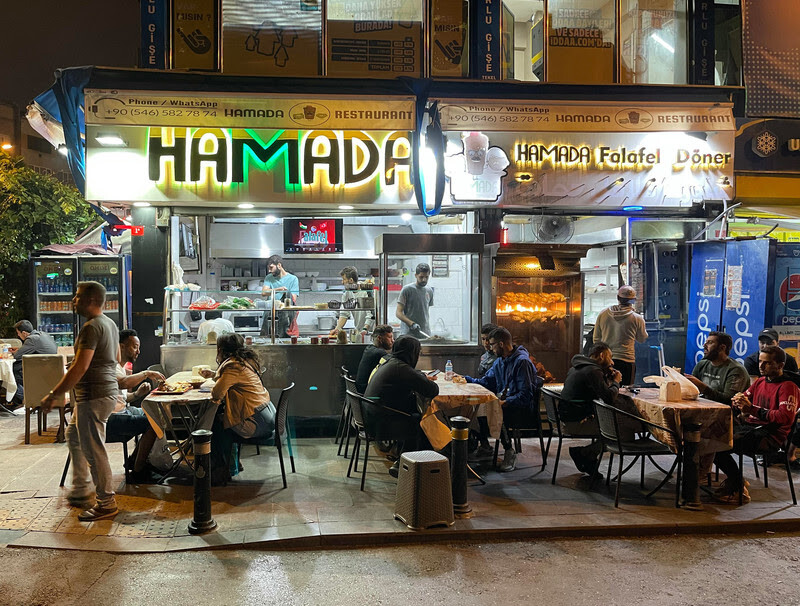The Electronic Intifada 20 October 2022

Diners gather at the Palestinian-owned Hamada restaurant in the Aksaray neighborhood of Istanbul.
In the heart of the Aksaray neighborhood of Istanbul, groups of Palestinians gather at the Hamada restaurant for lunch and dinner. The restaurant serves shawarma, Gaza-style, with tahini, onions and crushed sumac, all wrapped in taboon bread. On their menu, this sandwich is called the “Gazan shawarma.”
The restaurant, owned by a Palestinian from Gaza, is open till midnight, and the atmosphere is lively as Palestinians meet up with other Palestinians who have migrated to Turkey, whether for work, study or tourism.
For some Palestinians, it’s their first time to meet other youths from Gaza or the West Bank. And though they are all in Istanbul now, their journeys here were different.
While Palestinians from the West Bank can fly into Turkey from the Ramon airport in Israel (newly opened in August 2022 for Palestinians), Palestinians from Gaza must first travel to Egypt through the Rafah checkpoint. From there, they fly to Turkey via the Cairo airport.
Despite the arduousness of either journey, many Palestinians from Gaza say that Turkey is the best and easiest destination for them, because they can actually get tourist visas and work accommodations with relative ease.
The conversations that take place at Hamada, then, can be pressing: discussions of Israeli checkpoints, mutual hardships, the Israeli siege on Gaza. And, of course, they also talk about their dreams and their hopes for their future, which, for many, is why they came to Turkey in the first place.
“Unfortunately, the Gazans believe that Turkey is a country of dreams for them,” says Rageh Nassar, the head of a nonprofit organization in Turkey called the Palestinian Community in Istanbul. “The conditions in Gaza are very difficult, but in Turkey it is also difficult.”
Many Palestinians from Gaza who have come to Turkey are now understanding the difficulty of starting a life in the country, and they are finding that it is not the “country of dreams” that they had anticipated.
“There is no prospect of a future”
The Electronic Intifada interviewed 83 Palestinians from Gaza in Istanbul (63 men and 20 women), and 78 said they wanted to travel beyond Turkey. Of these, 68 said they had no objection to undocumented migration. Additionally, 20 had come to Turkey on scholarship and did not want to return to Gaza.
For instance, Haitham al-Ashkar, 34, has been in Istanbul since May 2018, when he left Gaza to look for work.
After graduating with an accounting degree from Al-Azhar University, he looked for work for six years in Gaza and found nothing. Currently, he says it’s not an option to return to Gaza because the economic conditions there are so dire.
“For four years I worked as an accountant in Arab companies and restaurants [in Istanbul],” he says. “I got a good wage from the Turks, about $350 [per month] because I became proficient in Turkish.”
Yet, in June 2022, conditions worsened for al-Ashkar and many other Arab residents of Turkey when Turkish Interior Minister Suleyman Soylu announced that Turkey would not permit visa renewals or residency permits for visitors who had obtained tourist visas after February 2022.
“Unfortunately, I had a tourist residency,” al-Ashkar says, “and the general migration department in Istanbul refused to renew my residence, like many.”
The Turkish government, in June 2022, even banned foreigners from living in certain districts in Istanbul and other Turkish cities. This measure is so that foreigners do not “exceed 10% of the population in a city” in Turkey.
The list of restricted areas includes a staggering 1,169 neighborhoods throughout 58 cities in Turkey.
The majority of Palestinians from Gaza in Turkey reside in Istanbul, specifically in areas such as Esenyurt, Fatih, Sirinevler and Avcilar, say Palestinian residents in Istanbul.
“The conditions are getting worse here, there is no prospect of a future,” al-Ashkar says, “and the need to seek asylum in Europe for me has become a humanitarian duty, even if it is illegal.”
Turkey as way station to Europe
Nasser Maher Rahma, 33, lives in Istanbul’s Avcilar district, and he has spent the past four years in Turkey thinking of how he can get out. But any hopes for migration seem impossible given his medical situation.
In February 2014, while working as a photojournalist, he was shot in his leg by an Israeli soldier during demonstrations east of Gaza City.
The injury caused the disintegration of his bones and muscles. He worked for two more years as a photojournalist in Gaza, but his injury made mobility difficult.
He traveled to Turkey in 2019 to look for office work and to possibly receive medical treatment, such as surgery or a bone implant, for his injury.
Upon arrival in Turkey, he attempted to cross the land border with Greece with a group of Palestinians, but they were arrested by Turkish authorities and spent two days in jail. Rahma was fined but not deported.
Based on The Electronic Intifada’s interviews with Palestinians in Turkey, the perception is that it’s not common for Turkey to deport Palestinians. Many also sense that Turkish police, who are deployed in the streets of Istanbul to check foreigners’ documents, especially in Arab areas, sympathize with Palestinians and are often harsher toward Syrians.
Rahma tried to settle into a life in Turkey, even though it was precarious.
“I worked in the first year,” he says. “I worked in the field of real estate writing, then in office tourism professions targeting Arab customers.”
During the pandemic, though, the tourism work dropped off and his health deteriorated. Since then, his leg has lost an additional 2.5 centimeters of bone and he continues to lose height. Surgery is too expensive, around $10,000, and he is again considering migration because life in Turkey is only becoming more difficult for migrants.
“Today, I am looking for any way to migrate because my tourist residency was refused renewal,” Rahma says. “I can’t go back to Gaza despite my love for it, but I want a new homeland to start again.”
Swimming to Greece
Khalid Hafez Shurab, 28, and Mustafa Khalid al-Samari had been missing for three days before their bodies were found on 17 October on the coast of the Greek island of Kos. Sakhar al-Astal is still missing.
The three men from Gaza had set out from the Turkish coast to swim to Greece – a route that many are choosing because they lack the funds to hire a smuggler with a boat to transport them.
The Electronic Intifada spoke with Shurab on 30 September in Istanbul, and he spoke of emigration to Europe because of the difficult economic conditions in Turkey.
Shurab described longing to live in a place that he felt would respect his humanity. When he left Gaza at the end of 2020, he thought that Turkey might be that place.
He found a job as a carpenter and was living with six other men from Gaza in an apartment in the Avcilar district of Istanbul. Yet, after he lost his job, the idea of emigration became more pressing, even to the point where he said he would be willing to face death to emigrate.
Tragically, Shurab and other Palestinians are perishing at sea in a desperate bid to reach Europe.
On 15 July 2022, Majid Hamid, 27, drowned after he set off with a group of friends to swim from the Bodrum peninsula to the Greek island of Kos. Hamid’s friends in Istanbul say that the approximately three-mile swim to the island of Kos from Turkey is seven hours of nonstop swimming.
A friend of Hamid’s who preferred to remain anonymous tells The Electronic Intifada that “Majid was swimming and suddenly he got tired and I mounted him on my back and tried to continue swimming. But he died as the foam came down from his mouth. I continued swimming until we got arrested by the Greek Coast Guard. They tortured us for two days and returned us back to Turkey.”
The friend describes severe beatings at the hands of Greek authorities. Specifically, the Greek authorities wanted the group to tell them how they entered and who helped them enter.
In Gaza, Hamid had worked in interior car accessories, and when he was laid off from his job, he traveled to Turkey in 2019 to look for more job opportunities. Hamid’s family in Gaza was informed of his death when his friends were returned to Turkey.
“Returning to Gaza is a greater risk”
Omar, 30, who chose to keep his last name private, says he suffered from depression in Gaza so he traveled to Turkey in August 2019 in hopes of a better life and to find work.
For a while, he was successful, earning a decent wage working in hotels, restaurants and factories. But when the economic conditions in Turkey worsened, he decided to migrate elsewhere.
“It is not possible to establish a family or develop our life in Turkey with the recent procedures and residences,” Omar says, “and I did not have money to pay smugglers.”
This past July, he set out with a group of Palestinians to try to cross the Turkish-Greek land border, near the Turkish city of Edirne. But he was arrested by the Greek police, who beat him severely and handed him over to Turkish border security a week later.
“Unfortunately, we know that illegal migration is risky, but returning to Gaza is a greater risk,” Omar says, mentioning that, despite the risk, he is planning to try to migrate again.
In a poll of 385 people between the ages of 18 and 30 conducted in the Gaza Strip by the International Committee of the Red Cross, nine out of 10 young people said they believed their lives to be abnormal.
Of those polled, 95.6 percent said they have been negatively affected by the humanitarian situation in Gaza due to the decline in job opportunities.
Nearly 43 percent believe they have no hope of getting a job in the next 15 years, and 67.5 percent believe that there will be new rounds of Israeli escalation in the future.
Amjad Ayman Yaghi is a journalist based in Gaza.




